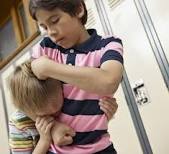Blog Archives
Zero Tolerance
The funny thing about my Aspergers is that it blesses (curses?) me with extreme polarity. I can remember the tiniest minutiae of information, yet I can’t remember where I put my keys. I can deal with major levels of discomfort, but I can’t handle having an itchy tag on the collar of my shirt. And while it gives me the ability to tune out things that drive me crazy, it also makes me lose my shit at the smallest provocation.
So that’s where my keys were.
My tolerance level is practically nil for certain EXTREMELY annoying things. Recently, my daughter has begun making this really strange noise with her mouth/throat that makes me nauseous. It sounds like a pig trying to stop itself from vomiting. In fact, you know what? I can’t even describe how gross it is, so I’m going to let you experience it for yourself:
My daughter’s disgusting throat noise.
I told you so.
Now, I don’t know if this is some sort of new stim/nervous tic she has developed, but I have told her over and over again to STOP MAKING THAT GOD DAMN NOISE. But she doesn’t stop. Most likely can’t stop, but that makes no difference to me. Last night she made the noise at least ten times while we were playing Life, until finally I couldn’t take it anymore. I told her if she kept doing it, I’d make sure she wouldn’t be able to play at Life anymore. And I wasn’t talking about the board game.
She didn’t think it was funny, either.
And it’s even funnier that as I’m writing a blog post about not having any tolerance for anything, I have a difficult time making the post exactly how I want it to be and end up throwing a tantrum over it. I can usually problem solve pretty effectively, but sometimes the problem is just so frustrating that it makes me just up and say “fuck this shit” and give up. I had some other things to talk about in this post, but I’ve kinda lost the groove after my energy-draining frustration explosion.
The Sensory Experience of Autism

People on the Spectrum experience the world in a different way. The senses of someone with autism are wired in such a different way that it is almost like they are living in a different world than a neurotypical people. Different stimuli lead to different behaviors that are considered “abnormal” – imagine if everybody in the world was wearing sunglasses except for you. You would think that the sunlight was too bright, and everyone else would just think you are crazy.
They would also be so much more cooler than you.
That’s what what autism is like… sort of. A child on the spectrum will react to loud noises that are not quite so loud to everyone else. A person with Aspergers will tune out everything in the room except for the smallest little thing that has grabbed his or her attention, simply because it is not so small to him or her. It’s not only that our reactions are different; our perceptions are altered, as well.
I went to the orthopedist the other day to address some pain issues I’ve been having in my elbows and wrists. The doctor begins examining me and asks me if it hurts if he does this, what pain level am I at if I do that. Now, I’m lucky to have been blessed with a high tolerance for pain (possibly due to my Aspergers). In order to answer his question to get the desired result – him actually giving a fuck about my arm hurting and doing something about it – I need to do an “Aspie-to-NT Pain Conversion” calculation. Simply put, I lie and say my pain is worse than it really is.
“… then we multiply by the indifference constant to overcome the “Who Gives a Shit” factor…”
But the skewing doesn’t just go one way. If the doctor asked me on a scale of 1 to 10 how big of an annoyance having a fold in my sock is, I’d answer “OH MY GOD, YOU HAVE NO IDEA WHAT HELL I’M LIVING IN AT THIS MOMENT!!!!” So it’s not like I’m completely numb in one direction or overly sensitive in the other; it swings both ways. My stimulus filter is tuned differently than most other people’s are. So I’m forced to adjust, and as I grow older I learn the ways to adjust the way I see and feel the world to fit closer to what would be considered”normal.”
Light It Up Blue!
April is Autism Awareness Month – today being World Autism Awareness Day specifically – so it’s a very special day for me and my family. I’ve decided to tweet out autism facts for the entire month because not many people are aware of exactly how strongly autism permeates our society today. Autism affects so many people that it’s hard to find someone who’s life is not touched by autism in some way.
The signs aren’t always this obvious.
Most people choose to spread awareness through the “Light It Up Blue” movement. Support has been outstanding and overwhelming. Over 40,000 people have committed to raising awareness for autism by joining in. Many landmarks around the world have been bathed in blue light to bring attention to the cause. My wife is doing her best by turning just about any part of her body blue that will cooperate – her hair, her nails, even her toes (you can thank Raynauds for that). Not sure how blue became the color of choice, but my wife sure is happy about it.
Some of the best things in the universe come in blue.
So I encourage you to join in and Light It Up Blue for the month of April! Let the world know that Autism is something to be embraced, not to fear or run from. Awareness is the first step towards acceptance; let’s take that first step together.
Triggers
Yesterday, I sent out a semi-serious tweet about the possibility of throwing a tantrum because I didn’t get pizza for dinner. As ridiculous as that sounds, aspie tantrums can very well be triggered by something that insignificant. Perhaps something of even less importance.
For example, not getting the Golden Goose that you found out existed only five minutes ago.
Fatigue is a very common tantrum trigger, although not so much for me – my wife will tell you otherwise, but I simply get crabby. Hunger is also a big one on the list of triggers. Specifically for people with aspergers, crowds and social events can lead to meltdowns. For those with autism, loud/unpleasant noises or sensations can cause a blow up. Then you have the triggers that are specific to each person – schedule changes, absence of a normal favorite choice, etc. I know I tend to go nuts if I can’t find something that I’m looking for right away.
GFY, Waldo.
The importance of knowing these things is not to remove all of the triggers from the world of the Spectrumite – that’s pretty much impossible. What’s important is to know that these triggers do exist, and that a tantrum can be caused by the smallest little thing that you couldn’t even notice if you tried.
What are some of the small triggers that you have seen influence you or someone with Aspergers/Autism?
Please fill up my comments section. It makes me feel important.
Mapping Autism
An interesting article was brought to my attention about mapping the brain’s connection signals and perhaps being able to diagnose Autism with the results. I will admit , the article was a good read. And it seems to make some sense, at least to me.
The study mentioned in the article discusses the linkages made between different parts of the brain, and the patterns of those linkages are different in the presence of different conditions (such as autism and spectrum disorders). What this means, basically, is that people with ASD have brains that are wired differently than neurotypical people. This is not earth shattering news; this has pretty much been an accepted idea for quite some time now. The importance of this study is how these connections are mapped, and how this mapping info can be used to confirm a diagnosis of autism.
Just trust me, it can.
Currently, a diagnosis of autism is very subjective. It pretty much comes down to “you look like you have autism, you must have autism.” Uh, duh. What this mapping info gives us is a way to compare and contrast traits of an ASD brain to a neurotypical brain. Some of these differences are quite striking.
One difference the article mentions is the presence of “redundancy connections” in the ASD brain. This sounds like a good thing, but it’s not really. It allows the ASD brain to focus intense concentration on location-centric processes, but it fails when using cross-referencing skills (i.e. deciphering emotions, social interactions, etc.). Details like this in the study push me more towards believing the results are accurate, because we all know that spectrumites have issues with those types of cross-brain processes.
I suggest giving the article a read. It’s very interesting. And hopefully this will lead towards a better understanding of autism and other ASD conditions in the future.




































